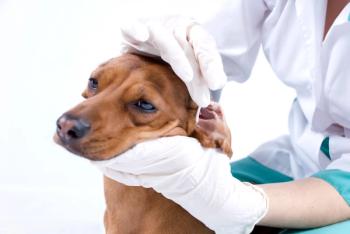
Nascent research from China details the potential for infection with SARS-CoV-2 in domestic animal species, including ferrets, cats and dogs, as well as some livestock.

Nascent research from China details the potential for infection with SARS-CoV-2 in domestic animal species, including ferrets, cats and dogs, as well as some livestock.

Want to be in the know? Check out the veterinary news highlights from this week.

California house-call veterinarian Dr. Patrick Mahaney shares some of the changes he’s implemented during the COVID-19 pandemic.

A symptomatic cat in Belgium has tested positive for the novel coronavirus, but experts reiterate that there is no proof that animals can transmit the disease.

A flagship study details tick infestations in pet dogs and cats in the United States.

The new WSAVA initiative has already awarded one veterinarian with scholarship funds, pain management training and the title of the first key opinion leader of veterinary pain management, but the technician scholarship is still up for grabs.

According to the university's veterinary team, this screening tool is superior to any other that utilizes routine blood tests available to veterinarians.

A New Jersey small animal veterinarian shares how the pandemic has impacted his practice and explains his new approach for veterinary house calls.

A recent webinar for veterinary practice owners and managers shed some light on how to reduce workplace exposure to the novel coronavirus, and the legal rights and responsibilities when it comes to employees and their business.

This mispronunciation may elicit giggles, but our clients may actually be onto something. Here’s why veterinarians might want to turn up the heat on heartworm tests.

Veterinarians and medical professionals should conserve personal protective equipment (PPE) until supplies become more readily available.

Practice manager and regular dvm360.com contributor Emily Shiver shares how her clinic's protocols are evolving during the COVID-19 pandemic.

Both associations have urged lawmakers to classify veterinary practices as ‘essential’ because, they say, not doing so could negatively impact both animal welfare and the wellbeing of pet owners.

The dean of Cummings School of Veterinary Medicine at Tufts University explains how and why veterinary professionals are vital in the fight against the novel coronavirus.

In every corner of the world, people are doing their part to thwart the spread of COVID-19. dvm360 columnist Dr. Mike Paul shares what he’s experiencing on the tiny island of Anguilla.

Want to be in the know? Check out the veterinary news highlights from this week.

Idexx has tested thousands of dogs and cats, and all came up negative for the coronavirus strain that causes COVID-19.

The dog has shown no clinical signs of the disease but is under quarantine in a government animal housing facility.

This independent organization is at the forefront of heartworm disease monitoring.

You know your veterinary clients need to be proactive partners in the successful management of a pet’s ear infection, whether acute or chronic. Use these communication tips to ensure a positive outcome for the pet, the pet owner and your entire team

As one of the top reasons dogs come into your veterinary clinic, you certainly get a lot of practice diagnosing otitis. But because practice doesn’t necessarily make perfect, veterinary dermatologist Dr. Ashley Bourgeois shares her solutions to some common diagnostic conundrums.

Don’t let faulty ear cleaning be the reason your veterinary patients suffer from chronic ear disease.

Subtle, nonspecific clinical signs coupled with no identifiable trigger make pancreatic disease an elusive diagnosis.

Cannabidiol is already being used to mitigate obsessive-compulsive behaviors in horses. This study aims to find out whether it’s actually working.

It remains unclear how much havoc the COVID-19 pandemic will wreak for people and businesses around the world before it ends. In the meantime, the AVMA continues to offer guidance for veterinary practices.

Otitis in puppies (especially those floppy-eared cuties) can be tricky for pet owners to catch until the infection is well on its way to causing pain and discomfort. Give clients this handout so they can recognize clinical signs of otitis as early as possible.

Researchers from Colorado State University want to stop feline enteric coronavirus before it has a chance to mutate into feline infectious peritonitis.

It’s been something of a struggle to establish pet insurance as a standard in pet care in the United States, but a new generation of pet owners may be changing that.

Make sure pet owners understand that ear cropping isn't a get-out-of-jail-free card when it comes to otitis externa.

Feeling confident in your history-obtaining abilities, veterinarians? If you’re not asking your veterinary clients these 11 questions the next time you’re facing an otitis case, you might want to reconsider.